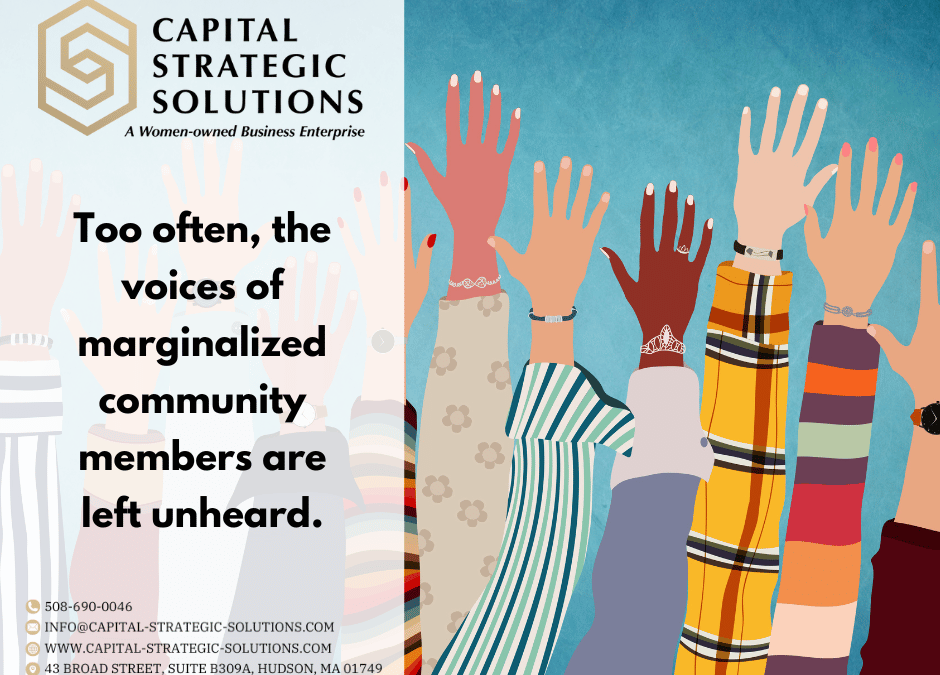In the tapestry of our communities, every thread contributes to the strength, resilience, and beauty of the whole. Yet, too often, the voices of marginalized community members—those who are frequently overlooked due to race, ethnicity, socioeconomic status, disability, or other factors—are left unheard in shaping the future of their communities. To create inclusive, vibrant, and equitable communities, it is crucial to actively communicate with these individuals and ensure their perspectives are included in decision-making processes.
Understanding Marginalization and Its Impact
Marginalization occurs when certain groups are systematically excluded from opportunities, resources, and decision-making processes that shape their lives and communities. This exclusion can lead to a cycle of disadvantage, where marginalized individuals feel disconnected, disempowered, and unable to influence the direction of their own lives or the community at large.
This disconnection has profound implications. When marginalized voices are absent from the conversation, decisions made by community leaders may fail to address the needs and concerns of all residents. This not only perpetuates existing inequalities but also weakens the social fabric of the community. True progress can only be achieved when every community member has a seat at the table.
The Power of Inclusive Communication
Inclusive communication goes beyond merely sending out information; it involves actively listening, engaging in dialogue, and creating channels through which marginalized individuals can share their experiences and insights. Here are a few reasons why inclusive communication is vital for shaping a community’s future:
- Fostering Trust and Collaboration: Open and honest communication builds trust between community members and leaders. When marginalized individuals see that their voices are valued and heard, they are more likely to engage in collaborative efforts to address community challenges.
- Ensuring Equity in Decision-Making: Inclusive communication helps ensure that decisions reflect the needs and aspirations of all community members, not just those who are most vocal or visible. This leads to more equitable outcomes and a stronger, more cohesive community.
- Harnessing Diverse Perspectives: Marginalized individuals often bring unique perspectives and innovative solutions to the table. By including these voices, communities can benefit from a wider range of ideas and approaches, leading to more creative and effective solutions to local issues.
- Building Resilience: Communities that communicate inclusively are better equipped to respond to crises and challenges. By ensuring that all voices are heard, communities can develop more comprehensive and resilient strategies that address the needs of everyone, especially the most vulnerable.
Practical Steps for Engaging Marginalized Communities
- Create Accessible Communication Channels: Ensure that all community members have access to information and the opportunity to participate in discussions. This may involve providing materials in multiple languages, offering meetings at different times, and utilizing various communication platforms.
- Engage in Active Listening: Go beyond traditional outreach by actively seeking out the voices of marginalized individuals. This could involve hosting listening sessions, conducting surveys, or partnering with local organizations that have established relationships within these communities.
- Empower Community Leaders: Support the development of leadership within marginalized communities by providing training, resources, and opportunities for these leaders to influence community decisions.
- Ensure Transparency and Accountability: Be transparent about how input from marginalized communities is used in decision-making processes. Providing feedback on how their contributions have shaped outcomes builds trust and encourages continued engagement.
- Promote Ongoing Dialogue: Inclusive communication is not a one-time effort but a continuous process. Regularly engage with marginalized communities, even when there are no immediate issues to address, to build lasting relationships and ensure their voices remain a central part of the community’s evolution.
“Amplifying marginalized voices isn’t just about inclusion—it’s about empowering our communities to thrive. Every voice, every story, and every perspective enriches the fabric of our collective future. It’s our responsibility to ensure that no one is left unheard in the process of building a stronger, more equitable community.”
Together, we can build communities that truly reflect the richness and diversity of all who call them home.

